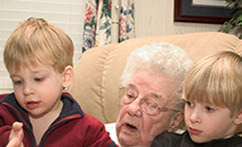Sandwich Generation
Sandwich generation is a term becoming nearly synonymous with our baby boomer generation. A term coined in the 80’s, it means that we’re the ones finding ourselves squarely in the middle of family demands - from our children and from our parents.
The math is simple enough – we boomers are in our 50s and 60s, our children are in their teens or 20s, and our parents are in their 70s or beyond.

Whether conscious of it or not, more and more of us are joining the ranks of the sandwich generation. Our parents are living longer than prior generations, and our children (echo boomers) are taking longer to launch or returning to the nest (boomerangs). Our folks may have various health issues accompanying their advanced ages, and our children have their own sets of issues that prompt their return or make them stay home longer. Much like Webster defines “sandwich”, we now find ourselves “inserted or enclosed between two things of another quality or nature.”
Sandwich Generation – Statistics
The sandwich generation is growing. According to the US Bureau of the Census, the percentage of men age 25 to 34 living in the home of their parents rose from 14 percent in 2005 to 19 percent in 2011 and from 8 percent to 10 percent over that same period for women. Studies conducted by the Pew Research Center indicate that one in every eight middle-aged Americans – that would be us right now – is currently caring for at least one child and a parent under the same roof.
Other studies show that women (75%) are much more likely to be the care provider than men (25%). It’s estimated that at some point in their lives, 50-66% of all adult women in the US will provide care for an elderly parent or in-law.
The Positives
Membership in the sandwich generation has its challenges to be sure, but before we think it more akin to a prison sentence, we remind ourselves of some real positives. First and foremost may be a renewed sharing of family values – remember reading about those from the 50s? Some of us even lived them! Our children might learn some family history from their own grandparents, not to mention some valuable life insights. In turn, our parents may no longer feel isolated or abandoned just because of age, in fact feeling more connected with day-to-day life and events. Everyone can celebrate family moments, and cherish them for a lifetime.

Another positive could be the pooling of resources, whether by desire or economic necessity. The down economy in recent years has likely deflated the value of portfolios and property alike, for us as well as for our parents. And if we ourselves are still struggling with wages lost from reduced work hours and furloughs, the pooling of remaining resources could make them stretch much further. In cases where the numbers are more favorable, it might make sense to add onto our own home or to relocate to new accommodations. Besides meeting an immediate need, dwellings that provide “in-laws’ quarters” may very well have an enhanced value in the future. After all, we may be the first generation to be sandwiched, but we’re certainly not going to be the last!
The upshot here is that once again we find ourselves being the drivers of another major trend, based squarely upon life realities. Whether a bump in the road or even a detour, we can still reach our destination as long as we plan accordingly and appreciate the trip!
Learn more about taking stock of your own particular situation, some Stress Tips, and getting organized for Parent Care.
- Home ›
- Sandwich Generation
